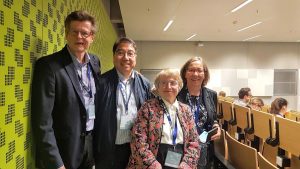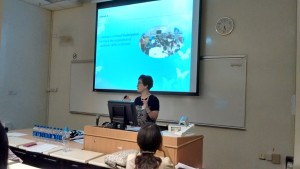
An article written by Teemu Nikkola et al. on the connections between creativity and sociality has just been published in the Journal of Early Childhood Research. the purpose of this article was to study children’s social orientations as creative processes in ECEC. We studied the connections between children’s creative thinking abilities and social orientations in interaction situations in ECEC. The results showed that participative orientation had a positive correlation with creative thinking abilities, which were fluency, originality, and imagination. Children’s social orientations inform us of the fruitful conditions for children’s participation in the building of the shared cultural content of ECEC. A participative orientation or changing and open way of acting in social interaction situations can be considered to predict children’s participation in this process. According to Amabile (1996), openness is a prerequisite for creativity. Engaging in the culture and contributing to its transformation are essential elements of both participation and creativity (Glăveanu, 2010). Children’s creative thinking abilities or divergent thinking can be considered to indicate their creative potential(Runco & Acar, 2012). Enhancing children’s creative potential enhances their creativity, but also enhances their possibilities to participate. However, creativity in interaction situations has not been self-evidently supported in ECEC. Teachers have considered the number of socially creative children to be relatively small (Chesnokova & Subbotsky; 2014). In addition, a participative orientation has also been shown to be rare in situations concerning teachers in ECEC (Nikkola et al., 2020).
There were also negative correlations with adaptive orientation and creative thinking abilities and with a withdrawn orientation and fluency. An adaptive and withdrawn orientation are both unchanging ways of acting. In comparison with participative orientation, these types are easier for teachers and more acceptable in ECEC in situations concerning teachers (Nikkola et al., 2020). However, openness to the situation can be considered to enable participation in the building of shared cultural content in ECEC. Within creativity learning can be viewed through its broader, multimodal, and dynamic goals for empowering children through participation, to support them in navigating and experiencing agency in the uncertain world (see OECD, 2018; Kangas etal. 2020). If children often use closed orientations, in other words, dominant and withdrawn orientations, they are in danger of not being creators of the shared content of ECEC culture. Furthermore, an unclear orientation tells us that children have difficulties connecting with the structure of ECEC culture and supporting their participation is essential.
According to Glăveanu (2010), culture can be defined as an accumulation of artifacts (norms, ideas, beliefs, material objects, etc.) that are ever-changing through the personal and collective acts of creativity. He states that creativity is the main engine behind cultural change and transformation. The OECD Education 2030 project states that transversal competencies should be at the center of education: creating new value, reconciling tensions and dilemmas, and taking responsibility (OECD, 2018). Of these, creativity is visible in the first one within the contexts of creativity as innovations and new solutions, as well as within the later ones, together with participation through the context of social relations and problem-solving skills. According to Kangas et al. (2020)to address these “Transformative Competencies” and to support children in being innovative, responsible, and aware, is to consider education through the notion that participation and playfulness is creative learning. In the ECEC setting, creativity can be seen to combine enthusiasm, co-operation, and challenging personal skills and competencies, but only when scaffolded through pedagogical participation by the personnel(Kangas & Harju-Luukkainen, 2021). Enhancing children’s creative thinking abilities, their creative potential, and participating in the building of the shared content of the ECECis essential for the future. Creativity is also an important part of learning and participation in ECEC. Especially play has been considered important for creativity and learning(Kangas et al., 2020). The perspective of creativity is strengthening its importance in the pedagogy of ECEC.




